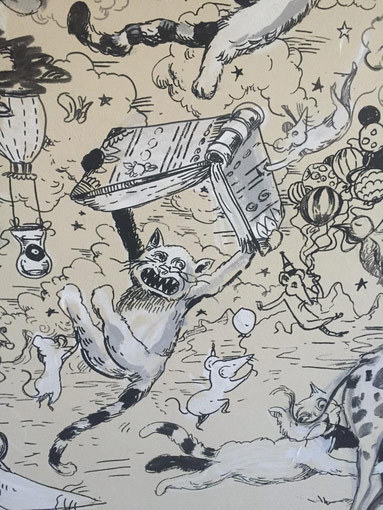Photo
That's a really good question, that should definitely be considered. Whilst noting that these projects are undoubtedly irrigated, theoretically dependent on climate and plant choice, they should work like a plant covered cliff, or steep hillside, and not require water input. Further, there's strong evidence that trees 'call' rain, so a leafier city environment may well receive an increase in rainfall, helping to mitigate water usage.


Two towers which overlook the Nanjing Pukou District are scheduled to be completed by the end of 2018. Overflowing with 1,100 trees from 23 local species, as well as 2,500 cascading shrubs and plants, the installation will clean the city’s air by producing 132 pounds of oxygen every day. Additionally, passersby and tourists will be greeted with a breathtaking view. There will be approximately 600 tall trees and 500 medium-sized trees, in addition to the other foliage, that will help regenerate biodiversity in the area, c. 2017. Photo credit: Credit: Stefano Boeri Architetti — at Nanjing.
64 notes
·
View notes
Photo
Molly Crabapple's wonderful art for a good cause.










Murals at the Jeel School library, on the Turkish/Syrian border, done as part of the Karam Foundation’s yearly Zeitouna Program, a mentorship program for Syrian refugee children
562 notes
·
View notes
Text
21 Stunning Photographs Of Nature Battling Civilization
culturenlifestyle:
In a high-paced moving world, we tend to forget how strong and resilient mother nature really is. We have compiled a list of stunning photographs, which showcase the strength found in vitality. Seeping through the cracks of cold, industrial spaces, the juxtaposition between a man-made structure and the symbolism of life prove to be both beautiful and ironic. Nature seems to beat out some of its strongest competitors, such as Hong Kong’s cityscape, a sidewalk, where nothing but lifeless concrete reigns, and even the radioactive city of Pripyat in the Ukraine.
Bicycle Stuck In A Tree On Vashon Island, Washington

(img src)
Abandoned Inner City Railway In Paris

(img src)
The Old Piano Tree, California

(img src)
Abandoned Shopping Mall Taken Over By Fish In Bangkok

(img src)
Old Abandoned Mill In Sorrento, Italy

(img src)
Trees Infiltrating Concrete In Hong Kong

(img src)

(img src)
Vintage Automobile Graveyard, Belgium

(img src)
Abandoned Mining Town, Namibia

(img src)
Abandoned 160-Year-Old Railway In Paris

(img src)
102-Year-Old Abandoned Ship In Sydney, Australia

(img src)
Tree Roots Overcoming Brick Sidewalk

(img src)

(img src)
Abandoned Mansion Near Kilgarvan, Ireland

(img src)
Abandoned Train Station In Abkhazia, Georgia

(img src)
I.M. Cooling Tower, Belgium

(img src)
Abandoned Fishermen’s Town In Kamchatka, Russia

(img src)
Angkor, Cambodia

(img src)

(img src)
Abandoned Hotel Room

(img src)
The Radioactive Ghost City Of Pripyat, Ukraine

(img src)
via Boredpanda
30K notes
·
View notes
Photo





An Open Letter From a Death Star Architect
25K notes
·
View notes
Photo



Attracting Beneficial Insects
I’ve written about the many benefits of insect hotels before, in terms of attracting pollinating and predatory insects to your space of cultivation.
As habitats of native bees, beetles, and butterflies are sometimes scarce, or in the way of cultivation, it is important to preserve refuges where these creatures can hide, and continue to symbiotically interact with your local ecosystem.
A number of solitary bees, and beetles like ladybugs—which pollinate fruit crops, and control aphids, respectively—live, have their young, and/or hibernate in hollow biological structures.

A solitary bee species, filling bamboo canes with mud to protect its larvae.
Dried “tubes” can be found all over the place in the spring, and are unfortunately often cleared from cultivated spaces: grasses, rushes, sedges, ferns, and flower stalks often leave behind a reasonably sturdy, dried hollow structure; I’ve also used cardboard tubing.

These materials can be packed into a frame of sorts (I used a length of PVC pipe), along with things like bark, clay tiles, and conifer cones for spiders, in order to provide an array of habitats.

The insects and arachinids will move in and do the rest.
Beside the home-made “bee hotel” above, I’ve also hung up an old butterfly house. These kinds of structures provide shelter for migrating and local butterflies, and mimic the crevices in trees and rocks in which these insects would normally find shelter.

DIY Butterfly House
Between the bees, beetles, birds, moths, and butterflies, and the worms in my compost system, there is a house or habitat for almost every local beneficial creature: except for bats. As soon as one of my trees reaches a sufficient height, I will be putting in a bat house as well.
The benefits of having a biodiverse forest garden system are manifold: these organisms pollinate, decompose, control pest populations, and deposit both seeds and fertiliser. It is in my best interest to have them around, filling out their ecological niches.
Related: Insect Hotels
7K notes
·
View notes
Text
Babies born 3 miles apart in New York have a 9-year life expectancy gap

A baby born today in Murray Hill, a neighborhood in midtown Manhattan, has a life expectancy of 85 years. A baby born six subway stops north, in East Harlem, has a life expectancy of 76. The 9-year gap shows up on this map, from the Robert Wood Johnson Foundation, meant to highlight the massive health-care gaps that exist within cities.
RWJF, a health-care-focused nonprofit, mapped a few other cities on life expectancy, and the results are similar.
2K notes
·
View notes
Photo






Herodium Palace | Via
Cisjordan, Palestinian territory. 22–15 BC (Abanoned: 71 AD)
1K notes
·
View notes
Photo










Urban Jewelry: New Lace Street Art by NeSpoon
226 notes
·
View notes
Photo







Thomas Kröger - Landhaus barn renovation, Berlin 2014. Photos © Thomas Heimann.
642 notes
·
View notes
Photo



El mar según Erwin Kneihsl (Viena 1952)
851 notes
·
View notes









